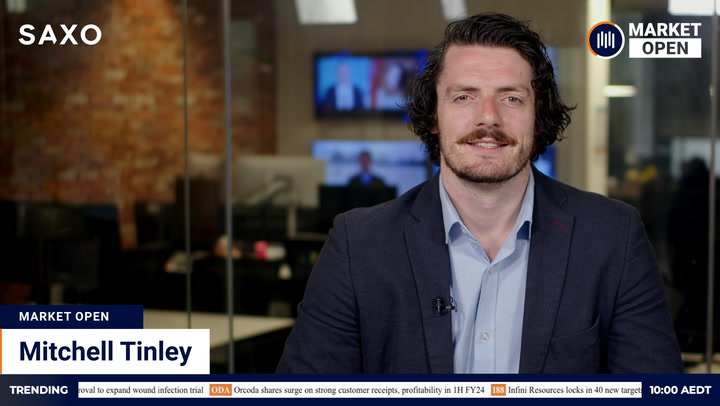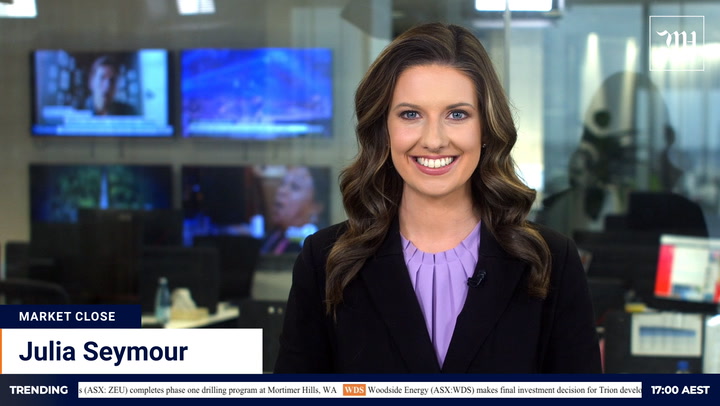Aussie shares fell for a fourth day but finished well off session lows as investors digested disappointing employment data and some poorly-received corporate updates.
The S&P/ASX 200 hit a one-week low mid-session before halving its loss from 94 points to 42 points or 0.57 per cent. Despite the partial reversal, this week’s losing run is the longest since immediately after the index hit a record in mid-August.
The market pared its fall as Telstra and Woolworths joined the major miners in positive territory. Fortescue Metals surged more than 8 per cent as investors embraced the miner’s pivot towards green energy.
What moved the market
Volatility returned with a vengeance after a period of relative calm characterised by modest moves in either direction over the last week and a half. A rollercoaster session saw the index open weak, jump on the mid-morning jobs news, dive, then rise again.
The dollar slumped after the jobless rate unexpectedly spiked to 5.2 per cent last month from 4.6 per cent in September. Total employment declined by 46,300.
Both figures were considerably weaker than economists predicted. The consensus was for a much smaller increase in the unemployment rate to 4.8 per cent as the economy added around 50,000 jobs. The dollar sank 0.47 per cent to 72.99 US cents.
However, economists were quick to point out last month’s survey was taken earlier than usual, at a time when the south-eastern states were still in lockdown.
“The timing of the October labour force report has been a key factor in determining today’s outcomes,” CBA’s senior economist Ryan Felsman said.
“A strong bounce-back in economic activity is already underway, as evidenced by near-record high business confidence, improving consumer sentiment and strengthening high-frequency measures of consumer spending and labour demand,” he added.
Ultimately more influential on today’s final outcome were a weak set of overnight leads and a string of disappointing trading updates as the annual general meeting season rolled on. Nearmap, Xero, Ramsay Health Care and Orica were among companies feeling the wrath of unhappy shareholders (more below).
Inflation is back at the top of investors’ list of concerns following “hot” reports from both China and the US. Overnight, the S&P 500 declined 0.82 per cent after consumer prices recorded their strongest annual increase in 31 years.
“The market was expecting an acceleration in US inflation numbers, in the end however the increases were larger than expected with the headline and Core readings printing at new multi-decade highs,” NAB currency strategist Rodrigo Catril said.
“Supply constraints may well turn out to be transitory, but the rise in core drivers increases the pressure on the Fed to trigger a monetary policy response,” he added. “The Fed’s resolve is facing a testing time, an increase in labour participation is needed to reduce upward pressure on wages while there is also a need for an increase in productivity.”
Winners’ circle
Fortescue Metals was the standout among the index heavyweights, soaring 8.19 per cent after the miner reassured investors its ambitions for clean energy had not been affected by a downturn in iron ore. CEO Elizabeth Gaines said the company’s ‘green’ subsidiary had unspent funds from last year’s bumper profit.
The other iron ore majors also rose off multi-month lows. Rio Tinto climbed 1.86 per cent and BHP 2.57 per cent. Telstra added 0.51 per cent and Woolworths 0.49 per cent.
Gold miners surged after the yellow metal logged its highest close since June. Regis Resources gained 6.47 per cent, Gold Road Resources 5.1 per cent, Evolution 5.06 per cent and Newcrest 2.39 per cent.
Chalice Mining was the index’s best performer for a third session since declaring it had found the biggest nickel sulphide deposit in Australia in 20 years. The miner’s shares gained 9.64 per cent to close above $10 for the first time.
Nine Entertainment climbed 3.04 per cent after upgrading the outlook for its publishing arm. The media group said its expected full-year earnings from the division to be between $40 and $45 million, up from previous guidance of $30-$40 million. However, CEO Mike Sneesby said it was too early to offer full-year guidance for the group despite “positive” signs.
Doghouse
Disruption from Covid-19 and a blowout in costs dented first-quarter earnings at Ramsay Health Care. Shares in the private hospital operator sank 3.99 per cent after the company warned unaudited earnings were 27.8 per cent lower than the same quarter last year. Unaudited profit fell 39.5 per cent.
Accounting software provider Xero sagged 6.22 per cent after reporting a half-year loss of NZ$5.9 million. The company said the loss reflected increased investment in sales, marketing and product development. Operating revenue increased 23 per cent year on year and total subscribers expanded by 23 per cent to three million.
Beach Energy dropped 3.1 per cent, broadly in line with rivals, after reaffirming it remained on track for its 2024 financial-year target of producing 28 million barrels of oil equivalent. The company intends to have eight gas plants by the end of 2023.
Woodside Petroleum declined 2.74 per cent, Santos 2.02 per cent and Oil Search 0.94 per cent.
A full-year net loss of $174 million sent shares in explosives manufacturer Orica down 3.65 per cent. Underlying earnings slumped 30 per cent as the company struggled against negative currency movements, increased shipping costs, rising input costs and the impact of trade tensions with China.
Nearmap slumped 12.33 per cent as investors sniffed at the aerial mapping group’s full-year guidance. The company expects annual contract value of between $150 and $160 million on a constant currency basis. The guidance fell short of the company’s long-term growth target of 20-40 per cent.
GrainCorp fell 0.15 per cent after reporting a return to profit. Underlying profit swung from a loss of $16 million in FY20 to $139 million last financial year. Managing Director and CEO Robert Spurway said the result was at the top end of guidance.
The big four banks declined. CBA shed 1.6 per cent, ANZ 0.18 per cent, NAB 1.63 per cent and Westpac 0.13 per cent.
Defensive stocks also came under pressure. CSL gave up 2.35 per cent, Transurban 1.75 per cent, Coles 0.68 per cent and Wesfarmers 1.4 per cent.
Other markets
Asian markets were mixed. The Asia Dow shed 0.28 per cent and Hong Kong’s Hang Seng 0.15 per cent. Japan’s Nikkei gained 0.47 per cent and China’s Shanghai Composite 0.59 per cent.
US futures were barely changed. S&P 500 futures rose a point or less than 0.1 per cent.
Oil trimmed some of its overnight loss. Brent crude rallied 19 US cents or 0.23 per cent to US$82.83 a barrel.
Gold firmed US$2.90 or 0.16 per cent to US$1,851.20 an ounce.





